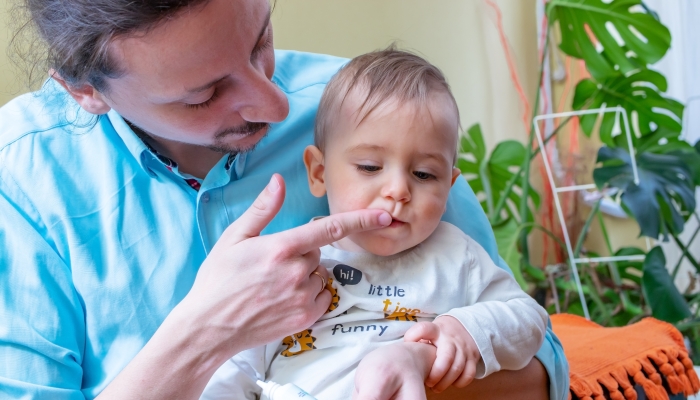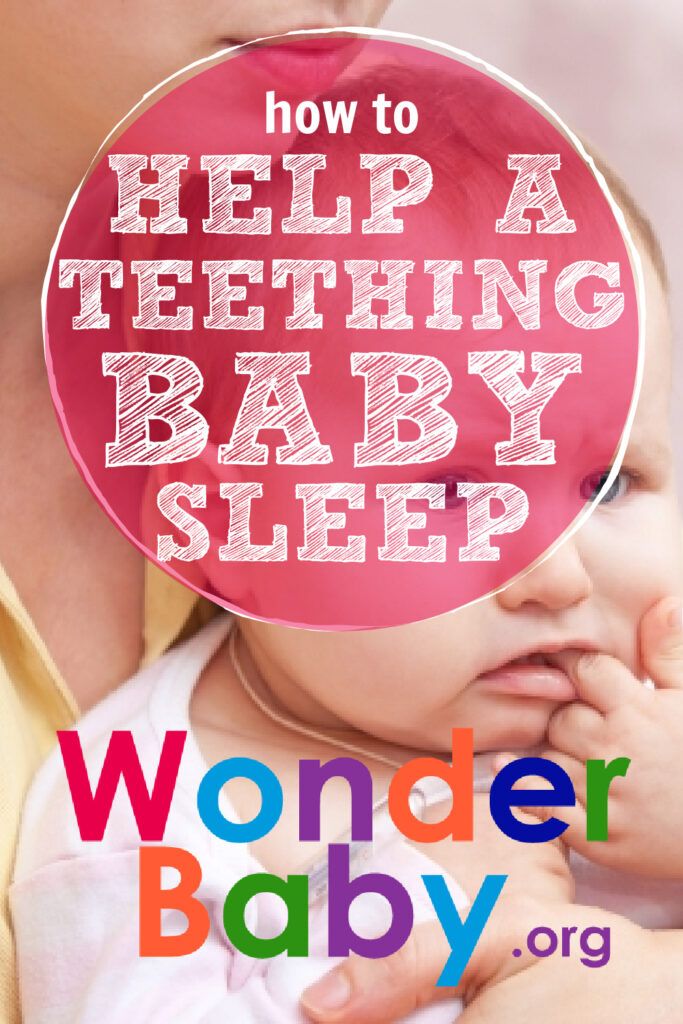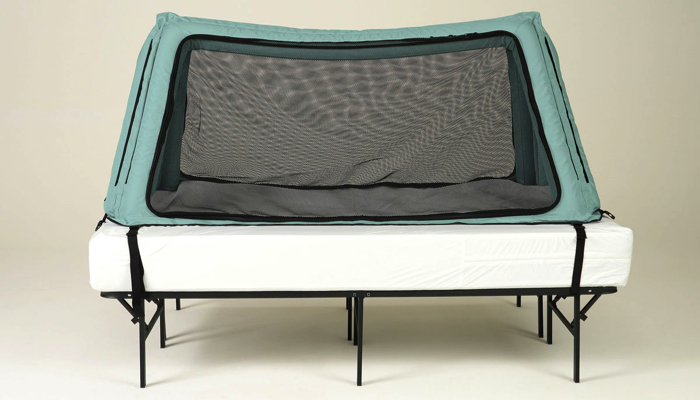How to Help a Teething Baby Sleep

- It’s common for teething babies to have disrupted sleep while their baby teeth come in.
- While there are many remedies available to help soothe teething babies, safety should always be the first consideration.
- Although it can feel like a difficult task, sticking with the bedtime routine during teething is important to prevent sleeping problems later.
Teething is one of those parenting experiences where it can feel like the whole household is upside down and everyone is losing sleep. Your baby is in pain and uncomfortable, their sleep is disrupted, and you’re sleep deprived too. You’ll wrack your brain for everything you can think of to help them.
The reality is that teething is uncomfortable for your baby and you’ll have some sleepless nights, but it’s a part of every baby’s development. And like all the stages your baby will go through, it will pass before you know it. But if you’re wondering how to help your teething baby sleep, remember to stick to your routines as much as possible and to use remedies that are safe as well as helpful.
Teething Signs and Symptoms
Your baby is having trouble sleeping and you suspect teething pain is the cause. How can you tell for sure that your baby is fighting sleep because of teething symptoms and that it’s not something else?
Some of the most common signs of teething include:
- Sore gums that are red and swollen
- Excessive drooling
- Fussiness and crankiness
- Chewing on objects
- A temperature that is raised, but not a fever
- Ear pulling
- Runny nose
Many parents think that fever and an upset stomach with diarrhea are also baby teething signs. But according to the American Academy of Pediatrics, while teething babies may have a raised temperature, any fever above 100.4 F (38 C) is not due to teething.
Babies with fever, vomiting, diarrhea, or rash during teething may have a different illness and you should consult your pediatrician. Keep in mind that baby teething symptoms can also mimic ear infections, so speak to your doctor to rule that out as well.

How to Help Your Teething Baby Sleep
You may have been able to distract your child during the day to help get their mind off the discomfort. But what can you do as bedtime approaches to soothe a teething baby? What can you do to provide relief if your baby won’t sleep?
First, don’t panic! Then, try some of these tips to ease your baby’s teething pain so everyone can get some better rest.
1. Let your child chew
As your baby’s teeth are coming in, they will want to chew on anything within reach. That is because a little pressure against their sore gums helps to alleviate some of the pain.
If they’re sleeping for small stretches and waking in the night with discomfort, there are some safe teething items you can give your baby to help soothe their gums:
- An adult’s clean finger
Simply rubbing your finger and using a little pressure against your baby’s gums can alleviate pain.
- A damp washcloth
Keep cold items like a damp washcloth chilling in the fridge to give to your baby. Make sure it has no strings or tags that could be choking hazards. The cold sensation can help sore gums.
- Teething toys
Teething rings that you keep in the fridge or freezer are very useful. Make sure any teething toy you use is solid rubber and not filled with gel or another substance inside that could hurt your baby if it bursts.
It’s important to note that while there are many baby safe products advertised for teething, many of them are not, in fact, safe. The Food and Drug Administration warns against the use of natural remedies or homeopathic teethers or jewelry with beads made of amber, wood, marble or silicone.
They warn that such jewelry worn by children is unsafe for them to mouth because of the substances that it may be treated with, even when labeled “baby safe.” Such pieces also pose a strangulation or choking risk.
However, there are safer options for teething necklaces that moms swear by for teething babies and for children with special sensory needs. They’re safe for the adult caregiver to wear and for the child to grab onto.
2. Over the Counter Medications
If your baby wakes a lot in the night, has a mild fever, and is struggling to sleep because of an erupting tooth, you may want to consider trying some pain relief medication.
When giving pain medication to infants, it is important to follow the instructions and give only the correct dose. Consult with your doctor so that you know which medications are appropriate for your child’s age. Infant ibuprofen is not suitable for children under six months.
It’s important to note that the American Dental Association and the FDA both warn against the use of numbing gels, like Anbesol or Orajel, because they contain benzocaine, an anesthetic that is harmful to infants. They also urge parents not to use homeopathic teething tablets because many contain belladonna, a dangerous toxin, in excessive amounts.
If you are going to use pain medication, be sure to use one approved by the FDA for infants and that you give it correctly.
3. Try to Maintain Your Bedtime Routine As Much As Possible
It’s just one of the realities of parenting that teething will be disruptive to your baby’s sleep as each new tooth makes its appearance. You might be worried that the gains you’ve made with sleep training will all be lost. Or maybe you’re thinking about foregoing sleep training entirely because of teething.
Parenting experts agree that if your teething baby is irritable at night, make them as comfortable as possible, but try to stick to your usual bedtime routine as much as you can. For example, if you have managed to get your child to sleep without being held, don’t let teething force you both back into old habits.
To make sure that teething doesn’t cause sleep regression, try to stick to your normal, calming bedtime activities. If your baby wakes in the night with teething pain, comfort and soothe them. But try to put them back to bed on their own so that they settle themselves and continue to learn self-coping skills.
Once an episode of teething passes they should be able to return to their usual way of sleeping because the bedtime routine has remained consistent.

4. Lookout for Other Symptoms That May Cause Discomfort
It’s not just the pain of swollen gums that might be making your baby irritable during an episode of teething. Excessive drooling is part of the territory, and it can also make your baby uncomfortable.
Invest in some dribble bibs and change them frequently. Always have a damp cloth on hand to help your baby with drooling. Too much saliva on the skin left unattended can cause a rash on the chin and under your baby’s neck. This can also make them feel fussy and uncomfortable.
Rashes on other parts of the body at this time will not be associated with teething. If your baby has a rash be sure to consult with your pediatrician.
How Long Does Teething Hurt?
Babies usually begin teething between four and seven months. Episodes of teething then continue until about the age of three. But don’t worry. Your child will not be continuously teething for all of that time!
Different teeth or pairs of teeth tend to come in at different ages. When teeth are coming in, your child will generally experience teething pain each time for about a week. They are likely to have some discomfort before the tooth emerges and then some pain for a few days afterward.
If what you think is teething pain lasts for longer than a week, consult with your pediatrician. Your baby may be experiencing symptoms of another condition not related to teething.

Related Posts

Sleep, Special Needs
Safe Place Bedding Travel Bed Review
Traveling with a special needs child can be stressful! Having a safe, durable, and easy to use travel bed can make traveling so much easier!

Sleep, Special Needs
Sleep Regimen for Premature Babies: Special Considerations
It can take premature babies much longer than their full-term peers to sleep for long stretches. A preemie sleep schedule may encourage better sleep.

Sleep
Mastering the Bedtime Routine: 3 Tips for a Peaceful Night’s Sleep
From around six weeks, a newborn bedtime routine can help your baby learn the difference between day and night and prepare for a restful night’s sleep.